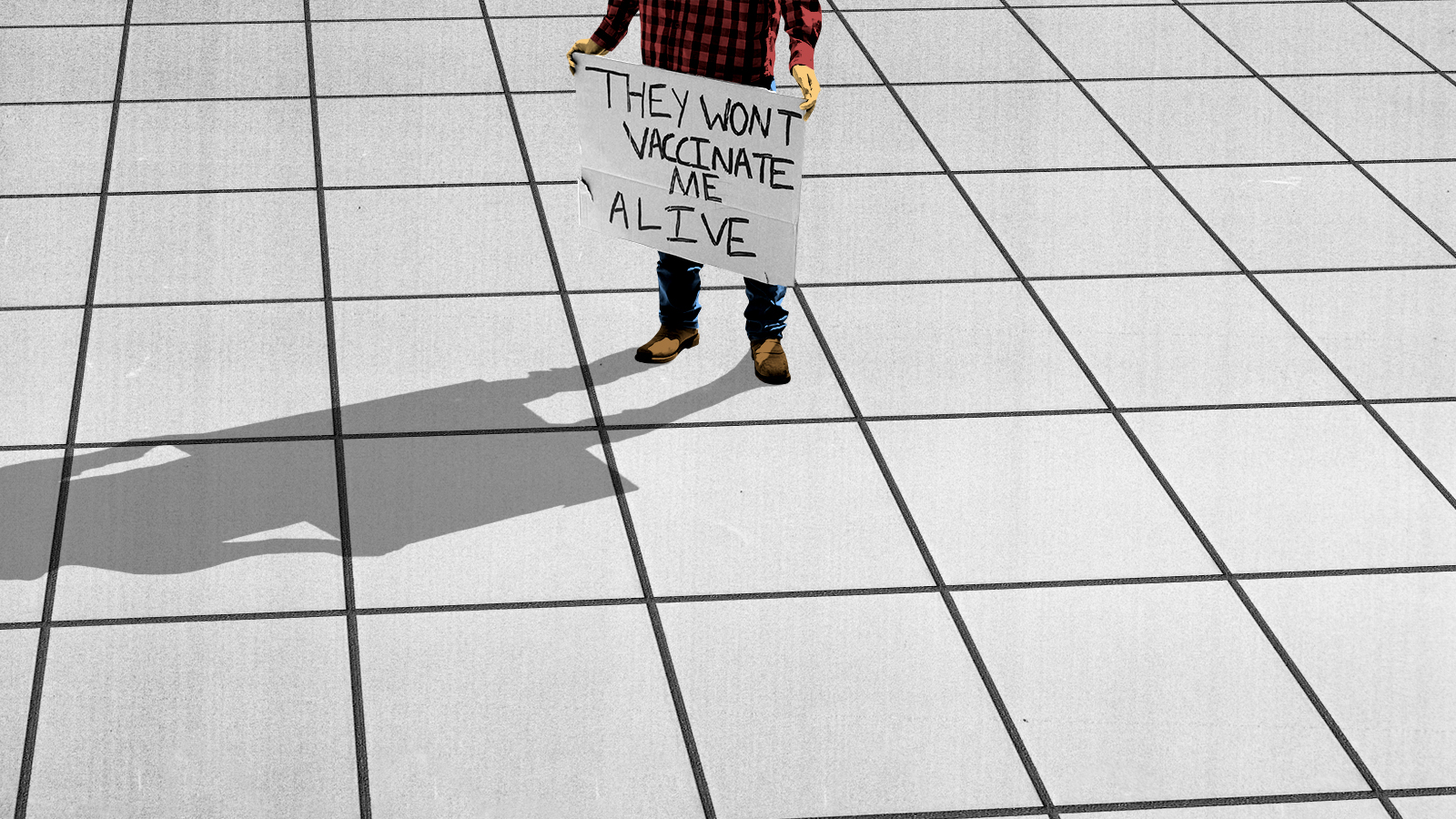The case against anti-vaxxer coddling
Liberals are right to be furious. And it's good politics too.


A free daily email with the biggest news stories of the day – and the best features from TheWeek.com
You are now subscribed
Your newsletter sign-up was successful
The coronavirus pandemic is back in the United States in a big way. Many had hoped that wide availability of vaccines would at least reduce the virus to a slow burn, but the combination of the ultra-contagious Delta variant and low vaccination rates in much of the country has caused a renewed surge of infection, hospitalization, and death. Across almost the whole Gulf Coast, cases are spiraling completely out of control, and states are running short of hospital ICU beds.
Vaccinated Americans are starting to seethe. In June and early July, it seemed like the U.S. nearly had this thing beaten. But now the stubborn entitlement of a reactionary minority is delaying the return of normal life indefinitely, and putting the lives of others — in particular, all the children under 12 and those with compromised immune systems who cannot get vaccinated — at risk. Surveys have repeatedly shown that vaccine refusal is largely a partisan phenomenon.
Some have argued that attacking anti-vaxxers is ineffective, or worry that it will lead to dangerous conflict. But a furious reaction is healthy, natural, and frankly overdue. Liberals should embrace their anger, and stand up to those who are deliberately prolonging the pandemic.
The Week
Escape your echo chamber. Get the facts behind the news, plus analysis from multiple perspectives.

Sign up for The Week's Free Newsletters
From our morning news briefing to a weekly Good News Newsletter, get the best of The Week delivered directly to your inbox.
From our morning news briefing to a weekly Good News Newsletter, get the best of The Week delivered directly to your inbox.
Here's where we stand as a country. The vaccines are proving to be somewhat less effective against the Delta variant, but still provide strong protection against infection, very strong protection against hospitalization, and almost complete protection against death. The highly-vaccinated states in the Northeast have so far seen only a relatively modest increases in cases, small increases in hospitalization, and few deaths.
But as noted above, the least-vaccinated states are in dire straits. Nationally, about 70 percent of people above 18 have gotten at least one shot, but the 30 percent of vaccine refuseniks are concentrated in conservative states — though I should note that only about a third of Republicans (presumably the hard core of dedicated partisans) say they will not get the vaccine.
As usual, I should add a caveat that this argument is not directed at people who haven't gotten a vaccine for more understandable reasons — lack of time off work, fear of needles, simple procrastination, or whatever — I'm talking about motivated, ideological anti-vaxxers and especially prominent cynical propagandists pushing that view. (Still, if you haven't gotten around to vaccination yet, please go and do it immediately. Lives are at stake.)
There is unsurprisingly a stone obvious correlation between the rate of vaccination and the rate of new cases, which are skyrocketing across the South. The major exception is Florida, which has about an average level of vaccination but among the worst outbreaks. However, this may be due to vaccine tourism — a lot of retired snow birds who got their shots because Florida opened up vaccine eligibility early, and people who came in from other countries for the same reason, who have since left the state — making its vaccination numbers look higher than they are. (It seems in some counties, data show well over 100 percent of the population vaccinated, which obviously can't be right.)
A free daily email with the biggest news stories of the day – and the best features from TheWeek.com
Florida, Texas, and the other Gulf states are this way mostly because of conservative propaganda. Right-wing pundits and politicians have fulminated not only against the vaccines, but also against pandemic control measures of any kind. Senator Ted Cruz (R-Texas) demanded that there be no requirements to get the vaccine the same day a Houston hospital was setting up overflow tents for COVID-19 patients. Florida Governor Ron DeSantis recently threatened to withhold the salaries of public school administrators who refused to obey his order banning masks in schools. Republicans are openly signaling that their midterms strategy will be to blame Biden for any new mask mandates or other requirements their own irresponsibility caused.
In the process, these men have put the suppurating moral core of movement conservatism on display: the idea that conservatives should always get to do exactly what they want, and that everyone else should also have to do exactly what conservatives want. The need for responsible behavior starts with you and ends with me. In particular, they view the prospect of having to do anything whatsoever to protect others — even if they protect themselves in the process — as an intolerable imposition on their personal freedom.
This explains their bizarre behavior regarding masks — in the initial stages of the pandemic, conservatives shrieked that mask requirements were an imposition on their liberty. Then when things got better and mask requirements were relaxed, they continued to shriek at anyone who personally chose to wear a mask (if not physically attack them). After a recent school board meeting in Franklin, Tennessee, anti-vaccine nuts openly threatened violence against medical professionals for testifying in favor of masks in classrooms.
One often hears the argument that one should be indulgent of anti-vaccine lunatics — that instead of criticizing them or coercing them to get the vaccine by banning them from air travel, restaurants, and so on, one should be compassionate or calmly rational. In the first place, there is no evidence that this actually works. Epidemiologists have been trying every possible argument for months now and it's made no difference, because conservative vaccine refuseniks are listening to Tucker Carlson, Alex Berenson, and Bret Weinstein (the ones who haven't died, at least).
More broadly, this attitude is reflective of a deeply baked-in defensive ideology among liberals that helplessly legitimizes conservative grievance. Democrats have been bending over backwards to appease conservative rage for 40 years — convincing themselves that they had to submit to Reaganism, attack their own core constituencies, retreat from civil rights, cut welfare, and so on, to win back the white working class. We see this today in moderate Democrats scolding Black Lives Matter activists to pipe down because they might alienate white voters.
But appeasing conservative grievance all this time has only strengthened their bottomless sense of entitlement and victimhood. At this point the whole right-wing project of stealing elections and setting up a one-party state depends on liberal cowardice — the solid majority of the country that supports democratic institutions, not to mention ending the pandemic as quickly as possible, simply lying down and taking it. Witness D.C. Mayor Muriel Bowser, who anxiously instructed residents of her city not to come out and counter-protest against the putschists on January 6 (for fear of inflaming conservative rage), thereby leaving the Capitol open to attack.
What's more is that pushing hard on responsible COVID measures is good politics in the here and now. Polls show a large majority of Americans support both vaccine mandates and virus control measures to fight Delta and save lives. Standing up for that platform puts Democrats on the winning side of a culture war battle and drives a wedge deep into the Republican base (which is not at all uniformly against vaccination).
It is not 1988 anymore. Conservatism is a distinctly minority phenomenon, and is becoming more so with every passing year. I for one have had it up to here with the shrieking anti-vaccine maniacs who are doing their level best to put more children in intensive care. They should be exiled from society until they get their shots, and their efforts to intimidate people against controlling the pandemic should be met with massive resistance.
Ryan Cooper is a national correspondent at TheWeek.com. His work has appeared in the Washington Monthly, The New Republic, and the Washington Post.
-
 Colbert, CBS spar over FCC and Talarico interview
Colbert, CBS spar over FCC and Talarico interviewSpeed Read The late night host said CBS pulled his interview with Democratic Texas state representative James Talarico over new FCC rules about political interviews
-
 The Week contest: AI bellyaching
The Week contest: AI bellyachingPuzzles and Quizzes
-
 Political cartoons for February 18
Political cartoons for February 18Cartoons Wednesday’s political cartoons include the DOW, human replacement, and more
-
 The billionaires’ wealth tax: a catastrophe for California?
The billionaires’ wealth tax: a catastrophe for California?Talking Point Peter Thiel and Larry Page preparing to change state residency
-
 Bari Weiss’ ‘60 Minutes’ scandal is about more than one report
Bari Weiss’ ‘60 Minutes’ scandal is about more than one reportIN THE SPOTLIGHT By blocking an approved segment on a controversial prison holding US deportees in El Salvador, the editor-in-chief of CBS News has become the main story
-
 Has Zohran Mamdani shown the Democrats how to win again?
Has Zohran Mamdani shown the Democrats how to win again?Today’s Big Question New York City mayoral election touted as victory for left-wing populists but moderate centrist wins elsewhere present more complex path for Democratic Party
-
 Millions turn out for anti-Trump ‘No Kings’ rallies
Millions turn out for anti-Trump ‘No Kings’ ralliesSpeed Read An estimated 7 million people participated, 2 million more than at the first ‘No Kings’ protest in June
-
 Ghislaine Maxwell: angling for a Trump pardon
Ghislaine Maxwell: angling for a Trump pardonTalking Point Convicted sex trafficker's testimony could shed new light on president's links to Jeffrey Epstein
-
 The last words and final moments of 40 presidents
The last words and final moments of 40 presidentsThe Explainer Some are eloquent quotes worthy of the holders of the highest office in the nation, and others... aren't
-
 The JFK files: the truth at last?
The JFK files: the truth at last?In The Spotlight More than 64,000 previously classified documents relating the 1963 assassination of John F. Kennedy have been released by the Trump administration
-
 'There is a certain kind of strength in refusing to concede error'
'There is a certain kind of strength in refusing to concede error'instant opinion 'Opinion, comment and editorials of the day'
